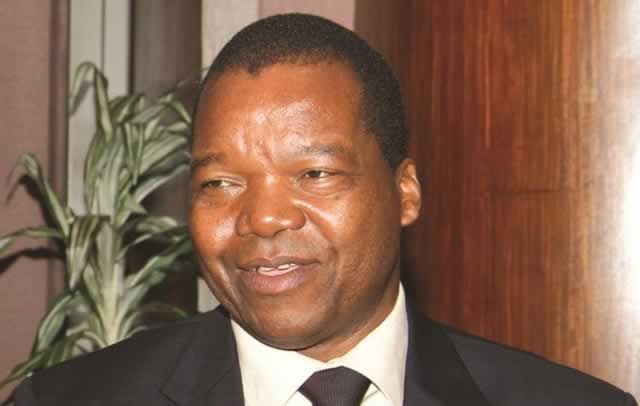Ride the storm, Dr Mangudya

Perspective Stephen Mpofu
A country’s central bank governor resigns his job in a huff after people, particularly those in business, thumb their noses on bold new measures to prop up the economy and bring it back to an even keel.
And you (yes, you) ululate, even go on drinking binges to celebrate the fall of the country’s monetory steward.
If you are in the category of such people, here is your label: you have one foot of your loyalty anchored on the soil of Zimbabwe’s enemies, and the other dangling barely above the ground in this country.
But you cannot honestly and earnestly expect to have and enjoy without let or hindrance the best of both worlds.
Something must break, and break loudly and with finality. This is because this country cannot be expected to harbor and even give legal protection to sell-outs, people who run with the hares – loyal and patriotic Zimbabweans – and hunt with the hounds, the enemies of this country.
Thus, people who feign loyalty to this country should without any further ado choose a D-Day — or Decision Day to come out in their true colours so that the people of this country know who their true allies are and who the chameleons hibernating in their midst are.
Such moments of truth about who belongs in Zimbabwe, or are mere passers-by nibbling at the country’s economic opportunities, while the warmth of the Zimbabwean sun permeates hearts laden with venom against the sons and daughters of the soil, are critical on the eve of the introduction by the Reserve Bank of Zimbabwe next month of bond notes, backed by a $200 million African Export Import Bank nostro stabilisation and export finance facility as part of the central bank’s export bonus scheme aimed at stimulating production while maintaining and sustaining the multi-currency system.
Supply of the United States dollar, which apparently dominated preferences for multi-currencies by local businesses and ordinary people, has seriously dwindled, siphoned, according to popular belief, out of the country by foreigners and local traders alike.
In Bulawayo, a fuel service station is reportedly refusing to accept bond coins, introduced by the Reserve Bank to avert a shortage of change in smaller denominations in business across the board.
Greater resistance to the bond note has been mooted, and Reserve Bank Governor Dr John Mangudya was reported this week as saying he would step down should the bond notes strategically fail.
For a start, the governor‘s threat to quit his job will, should it take effect, amount to a big let down for a country valiantly struggling to reassert control of its economy as any independent and sovereign state ought to do in face of external pressure to turn the country into a client state of imperialists eyeing our rich natural resources for exploitation by them, as what happened at the height of colonialism.
Secondly, and even more tragically, if Dr Mangudya does in fact go he will be validating, and to the glee of our enemies, the saying: “if you can’t beat them, join them.”
This pen is certainly not about to believe that the central bank governor wants to become an ally of those who wish this country ill — people who want the country’s economy to collapse yesterday as a way of effecting regime change in retaliation for the Zanu-PF government’s land reform programme under which thousands of Zimbabweans have so far recovered huge chunks of land stolen from them by white settler farmers in colonial Rhodesia.
In fact, some of those who resist the introduction of bond notes probably unknowingly hunt this country’s sovereignty with the hounds, the United States of America and its ilk who have a heinous plan to collapse the Zimbabwean economy overnight by banning access by this country to the US dollar that they know to be quite popular with business and ordinary citizens of this country.
Or those in the anti-bond notes lobby are paid agents of Zimbabwe’s enemies and have already been involved in attempts to render Zimbabwe ungovernable through violent demonstrations and other protests to try to shut down the country.
The US through its bank in 2015 stopped supplying its currency to Angola and South Africa, alleging that what it called lax regulations promoted money laundering in those countries.
However, Angola used its currency, the Kwanza, to overcome the initial shock caused by the withdrawal of the greenback.
Now if Angola with economic and social conditions similar to those in Zimbabwe after Portuguese colonial rule there did it, surely Zimbabwe can also triumph over any foreign engineered adversities if the people here have the goodwill and purposeful unity as their guiding principles in making independence and freedom a reality for all times and for all future generations.
Therefore, whatever the case might be concerning the introduction of bond notes, this pen humbly yet fervently urges Dr Mangudya to ride the storm and not hand the enemy undeserved victory on a platter.
And, who knows, a replacement for Dr Mangudya —who might actually turn out to be a paper tiger — will be a disservice to this nation.
The office of Central Bank Governor demands for its occupation a person with prevailing love for this country as well as one driven by an unflinching intrepidity.
But this pen believes the time is long overdue for the powers-that-be to get tougher with foreign and local sponsors of political mayhem which has the effect of not only portraying the government as weak in the eyes of the international community, but also seriously undermines economic and social programmes by the state to bail the economy out of the doldrums into which the Western economic embargo has plunged it and to a brave new future for all.
Unless put into effect, and be seen to take effect by giving foreign political spoilers short shrift and stocktaking their local ilk, threats against trouble makers in this country will remain just that — threats.











Comments